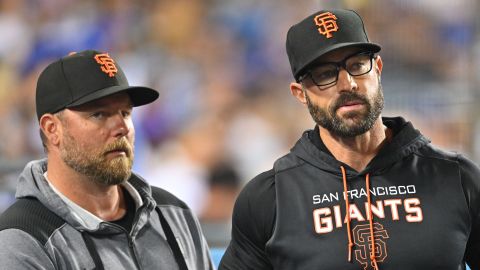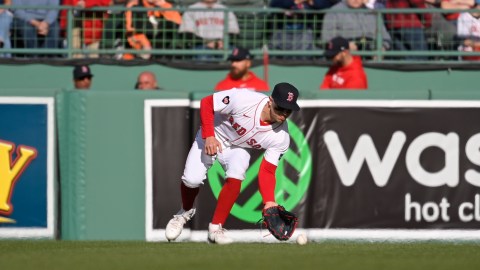Erik Bedard makes his Red Sox debut Thursday night. He's only expected to throw 75-80 pitches, a small taste of what we hope to see from him in the future, but we all know how important first impressions can be. Especially in Boston, where we'll be talking about Bedard's outing until he takes the mound again next Wednesday in Minnesota.
Bedard met with the media on Tuesday, and was all smiles as he chatted about the move to his new team. He did so in the clubs press room, the place where manager Terry Francona meets the media before and after every game.
You've probably seen the place on our postgame show before — the manager sits at a desk in front of a brick wall and answers questions. It's been the place where Francona holds his pre- and postgame media briefings for about five years now.
It wasn't always that way. Grady Little, and every Red Sox manager before that, had to talk to reporters in his small office in the back corner of the clubhouse. It was a cramped space for such meetings, an environment that bred anxiety in both the manager and the members of the media.
The press room was added as part of the ballpark's renovations after the 2005 season. We bring this up because it is where Bedard will talk to reporters after his home starts as a member of the Red Sox.
In case you haven't heard, Bedard has a rocky history with the press. Reporters in both Baltimore and Seattle (his previous two major league homes) say he'll have a tough time dealing with the media frenzy of Boston and Red Sox Nation.
Time will tell, but the opposite could wind up being the case. On this team, Bedard will be just another name. He's not the big-money arm expected to lead the team to a playoff run. In Boston, he'll be expected to pitch like a middle-of-the-rotation guy. He'll be surrounded by pitchers like Josh Beckett and Jon Lester, two of the most accountable athletes to ever call Fenway Park home.
For the most part, Bedard will only be expected to talk to the media every fifth day. And he'll do it from the comfort of the press room, where he will only have to take one round of questions. In a locker room scrum, waves of reporters come and go, and the same question can be asked three or four times. Or more. Not a huge deal, except when the question is, "Can you tell us about that hanging curveball that was crushed for a home run?"
What's more, Bedard will find himself in a clubhouse with the likes of David Ortiz, Adrian Gonzalez, Dustin Pedroia and others — players who have dealt with the media in different ways, but have never let the media contingent interfere with their game preparation or performance.
Dealing with the media isn't that hard. Then again, it can be more difficult in Boston than in other baseball cities. As a player, Ted Williams never met a baseball writer he liked. That legacy has continued to more recent players like Nomar Garciaparra. Nomar, now a member of the media on ESPN, went so far as to have the infamous "red line" put into the clubhouse, a line meant to keep reporters a "safe" distance from players.
We'll see how the relationship between Bedard and the media in Boston evolves. One thing is for sure, though: If he pitches well, if he helps this team nail down first place, he'll be loved by the fans no matter what he says — or doesn't say — to reporters.
Most players agree that Boston is a great place to play when you're playing well. It can be a very tough place to play when you're struggling. Bedard will ultimately be judged by what he does on the mound, not by what he says in the press room.


